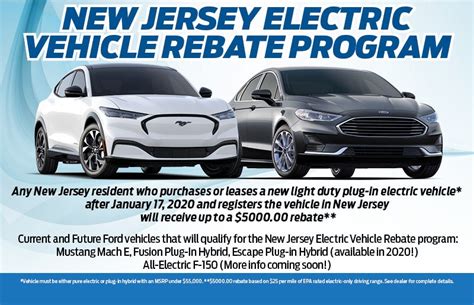As climate change continues to threaten our planet and air quality deteriorates, the push for greener transportation solutions has become more urgent than ever. In light of this demand, states are seeking ways to incentivize residents to adopt electric vehicles (EVs). New Jersey, a state that has historically faced challenges with pollution and congestion, has taken significant steps towards sustainable transportation. One of the most impactful measures is the Electric Vehicle Rebate program, aimed at making EVs more affordable and accessible for residents.
The Electric Vehicle Rebate Program Explained
Launched in recent years, New Jersey’s Electric Vehicle Rebate program is designed to encourage the adoption of electric vehicles by offering financial incentives. This rebate program allows residents to receive a rebate of up to $5,000 when purchasing or leasing a new electric vehicle. The amount varies based on the vehicle’s price and makes it easier for consumers to consider an EV as a viable option for their transportation needs.
Boosting Adoption Rates
The results of the rebate program have been encouraging. Since its inception, the number of electric vehicles registered in New Jersey has seen significant growth. By making electric vehicles financially accessible, New Jersey is helping to normalize EV use. Statistics indicate that states with robust rebates tend to have higher adoption rates. This trend is no different in New Jersey, where residents are increasingly making the switch from gas-powered vehicles to electric ones, thanks in large part to the rebate initiative.
Environmental and Economic Impacts
Transitioning to electric vehicles has profound implications for the environment. Electric vehicles emit far fewer greenhouse gases over their lifecycle in comparison to traditional internal combustion engine vehicles. As more residents opt for EVs, New Jersey is poised to see a significant reduction in air pollutants. This reduction can lead to better public health outcomes and lower healthcare costs associated with pollution-related illnesses.
Economically, the rebate program has the potential to stimulate growth within the green technology sector. Unsurprisingly, as the demand for EVs increases, so does the need for charging infrastructure. New Jersey is investing in expanding its network of charging stations, which provides opportunities for local businesses and jobs in the renewable energy sector. Furthermore, the electric vehicle market is projected to grow exponentially in the coming years, providing additional economic opportunities for the state.
Challenges and Considerations
While the Electric Vehicle Rebate program has had positive outcomes, it is not without its challenges. For one, the upfront cost of electric vehicles can still be a barrier for many potential buyers, despite the rebates. Although the state has made strides in offering incentives, more work is needed to ensure that these vehicles are accessible to all socioeconomic segments of the population.
Moreover, the program’s long-term sustainability hangs in the balance. Funding for rebate programs often fluctuates based on state budgets and priorities. Therefore, consistency in funding is crucial for maintaining momentum in electric vehicle adoption. It is vital for New Jersey to explore continuous funding solutions, possibly by considering tax reforms or dedicated green funds.
Conclusion
New Jersey’s Electric Vehicle Rebate program is a pioneering effort in promoting green transportation and addressing environmental concerns. By incentivizing the adoption of electric vehicles, the state is making significant strides toward achieving its climate goals. However, for the program to realize its full potential, ongoing efforts must be made to tackle barriers to access and ensure sustainable funding. As technology continues to evolve and charging infrastructure expands, New Jersey’s commitment to a greener future can set a precedent for other states to follow.
FAQs
1. How can I apply for the New Jersey Electric Vehicle Rebate?
Eligible residents can apply for the rebate online through the New Jersey Division of Taxation website after purchasing or leasing a qualified electric vehicle. Documentation, such as proof of purchase and vehicle information, will require submission.
2. Are all electric vehicles eligible for the rebate?
No, not all electric vehicles qualify for the rebate. The program typically covers new plug-in hybrid and battery electric vehicles that meet certain criteria set forth by the state. It’s advisable to check the list of eligible vehicles before purchasing.
3. Is the rebate available for used electric vehicles?
Currently, the New Jersey Electric Vehicle Rebate program is focused on new electric vehicle purchases and leases. Used electric vehicles are generally not eligible for the rebate.
4. Can businesses benefit from the rebate program?
Yes, businesses can benefit from the rebate program if they purchase or lease qualifying electric vehicles. The program is open to both individual consumers and businesses looking to transition their fleets to electric.
5. Will the rebate amount change in the future?
The rebate amounts are subject to state budget considerations and can vary depending on legislative changes. For the most up-to-date information, checking the New Jersey Division of Taxation’s website regularly is recommended.
Download Nj Electric Vehicle Rebate
